 |
North
High School Wall of Honor
Chester Irwin Lappen
Class of January, 1937
|
 |
 |
|
Research done by Claradell Shedd, Class of 1953. PAGE IN PROGRESS |
| Chester
Irwin Lappen |
| Chester
was a member of North High's class of January, 1937. His next of kin
was listed as Mr. Robert Lappen, 694 Polk Boulevard, Des Moines, IA.
Chet's service number was __________. The correct information will
be supplied for the chronology below when received from the family.
|
| Chester Irwin Lappen |
 |
| Year |
|
Rank |
|
Status |
 |
| January,
1937 |
|
x |
|
Graduated from North High,
Des Moines, IA |
| date |
x |
Worked |
x |
Where and when? |
| date |
|
Enlisted;
US Army |
|
Where and when? *Intelligence
unit. US Army Intelligence and Security Command (INSCOM)? Counterintelligence
Corps? |
| date |
x |
Training |
x |
Basic Training where and
when? |
| date |
x |
Training |
x |
Fort Ord, CA. |
| June, 1940 |
x |
Schooling |
x |
He and his future wife,
Jon Tyroler Irmas, graduated from UCLA. |
| June, 1941 |
x |
Family |
x |
Married Jon Tyroler Irmas. |
| June, 1941 |
x |
Schooling |
x |
Harvard Law School. Graduated
magna cum laude, establishing academic records. |
| date |
x |
Employed |
x |
Laramie, WY. Served as
a Special Agent in the U.S. Army Counter-Intelligence Corps. |
Examples
below:
March 10, 1942 |
x |
US Army |
x |
From San Francisco, CA.
Troop ship, converted SS Lurline, from San Francisco, CA. to Hawaii
(Oahu, and Hawaii). |
| date |
x |
US Army |
x |
Training at Schofield
Barracks, HI. |
| date |
x |
Enroute |
x |
Train from Fort Lewis,
WA to military installation near St. Louis, MO for discharge.
|
| date |
x |
Discharge |
x |
Home to Des Moines, IA. |
| date |
x |
Schooling |
x |
Where and when? Law degree?
|
| 1946 |
x |
Employed |
x |
Attorney in Los Angeles,
firm, Mitchell, Silberberg & Knupp, specializing in ______.
|
| Civilian |
x |
Retirement |
x |
In CA. |
|
*Intelligence
in WWII
The Military Intelligence Service, the Signal Security Agency, and,
for a time, the Counter Intelligence Corps were centrally directed organizations
under the control of headquarters elements in the continental United
States. However, the bulk of the Army's intelligence assets were in
the field, at the disposal of commanders in the different theaters of
operation established during the course of World War II. At the beginning
of World War I, Brig. Gen. Joseph E. Kuhn had stated that intelligence
was "as essential to modern armies as ammunition," and a second
world conflict continued to demonstrate the truth of this dictum. In
all the various theaters there were certain uniformities of intelligence
organization. Army officers served on combined intelligence staffs with
various Allies. The theater signal intelligence service was operated
on a compartmented basis separate from other intelligence activities,
and assignment of intelligence and counterintelligence specialists to
units was normally under centralized theater control. However, there
were also differences in intelligence arrangements from theater to theater,
depending on local conditions and circumstances.
In its allotment of campaign credits, the U.S. Army recognized the existence
of only three great theaters of operation in World War II: the American,
the Asiatic-Pacific, and the EuropeanAfrican-Middle Eastern. The actual
command structure was more fragmented than this might suggest. During
the course of World War II, major Army formations were committed to
combat in four geographic areas: the Pacific Ocean Area (POA); the South
West Pacific Area (SWPA); the European Theater of Operations (ETO);
and the North African Theater of Operations (NATO), later redesignated
the Mediterranean Theater of Operations (MTO). Paradoxically U.S. Army
contributions from an intelligence standpoint were greater in the Pacific
area, but the European war had a larger impact on the ultimate organization
of Army Intelligence. Most of American military resources in the field
went into the fight against Germany, including the bulk of Military
Intelligence assets. In addition, the nature of the language problem
inherent in operations against the Japanese made Pacific requirements
more specialized and less universal. The Army's focus on Europe and
the relatively shorter distances between Washington and the field in
this theater allowed lessons learned to translate rapidly into structural
modifications. |
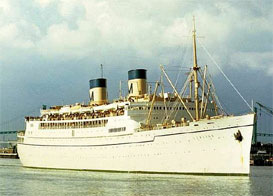 |
 |
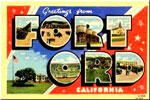 |
| SS
Lurline from San Francisco, CA to Oahu, HI; Camp Wolters, TX,
Ford Ord, CA |
|
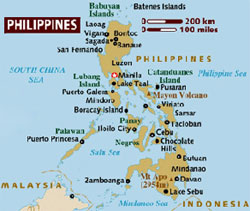 |
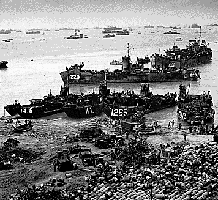 |
| Philippines (correct
photos coming) |
Okinawa Deployment
(correct coming) |
|
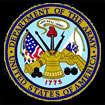

|
Chester Irwin Lappen
Rank?
Company I, 3d Battalion, 106th Infantry?
27th Infantry Division?
US Army

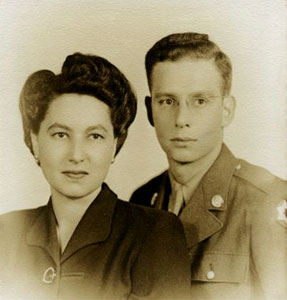
|
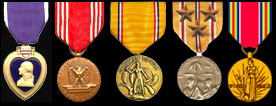
Examples: Purple Heart; Good Conduct; Asiatic-Pacific with three
battle stars; Victory Medal;
correct entries coming |
|
 |
Chester Irwin Lappen
May 4, 1919 - December 18, 2010
|
Our father, Chet Lappen, has died.
Surrounded by his loving family, he passed away peacefully from
natural causes at the Lappens' long-term home in Pacific Palisades
on December 18. He was 91.
Dad was born in 1919 in Des Moines, Iowa, to Robert
and Anna Lappen. He came to Los Angeles in 1936 to attend UCLA,
where he played basketball and, most importantly (for us), he
met Mom, the former Jon Tyroler Irmas. They dated throughout college
and were married in June of 1941, the year after they graduated
from UCLA. They moved together to Boston so that Dad could attend
Harvard Law School, where his impressive achievements included
serving as Editor-In-Chief of the Harvard Law Review, graduating
magna cum laude and receiving the Fay Diploma, the law school's
highest honor. In fact, Dad's grades at Harvard set the high-water
mark which stood for many decades and led him to be interviewed
on a national radio program to discuss his outstanding academic
achievements.
Following law school, Mom and Dad moved to Laramie,
Wyoming where Dad served as a Special Agent in the U.S. Army Counter-Intelligence
Corps. Like many fathers of his generation, Dad enjoyed regaling
us with his stories about how he won the war. Some of those stories
may have been at least partially accurate.
Dad and Mom moved to Los Angeles and, in 1946,
he joined the venerable law firm of Mitchell, Silberberg &
Knupp, where Dad's illustrious career spanned an amazing period
of over sixty years (he retired only a few short years ago). During
a remarkable career, he served on over twenty corporate boards
(many of which were for public companies) and represented major
motion picture studios. Dad traveled often, starting in the 1940s,
to domestic cities and foreign lands to negotiate on behalf of
his clients. He also represented major actors and actresses as
well as many leaders of the business world. His career paralleled
a time in the law where one could be involved with extremely disparate
matters, from litigation, corporate, land-use and development
and other distinct areas of the law. He truly was a titan of the
legal field, gaining the respect of both the legal and business
communities for his acumen and sharp business skills.
Dad was an avid golfer and was an early member
of Riviera Country Club. His love of golf no doubt was part of
the reason why our family moved to the Riviera section of Pacific
Palisades in 1953. Dad was proud of the fact that they'd purchased
the home from the novelist, Thomas Mann, one of several prominent
German émigrés who had moved to the Westside of
Los Angeles in the 1930s. Dad remained an active member of Riviera
Country Club until he died -- though no longer a golfer, he enjoyed
Sunday night dinners there with family and friends.
Dad was one of the early members of Leo Baeck Temple
and worked tirelessly alongside his brother, Stan Lappen, and
long-time friend, Rabbi Leonard Beerman, to develop the Temple
into one of Los Angeles' preeminent Jewish institutions. While
not a highly religious man in a formal sense, Dad was proud of
his Jewish heritage and spent much time and energy participating
in various research programs tracing the family's Jewish lineage
back many generations to Lithuania and Spain.
Dad was a provider. He was proud of the fact that
he took the family on many memorable vacations, some lasting for
several weeks, at a time when it was quite difficult for a business
person to stay in touch with "the office" while out
of town. For example, we spent six weeks on Maui in the mid-1950s
before Hawaii was a state. Other trips to such places as Western
Europe, Russia, Africa and Asia followed and will be remembered
always by his grateful family. Even in his later years, Dad put
a lot of energy into creating family experiences, including a
2003 riverboat trip down the Mississippi, from Memphis to New
Orleans, followed the next year by a riverboat trip on the Columbia
River in Oregon. And by "family", we are talking about
an entourage of children, grandchildren and great-grandchildren
totaling about three dozen people!
Dad's love of family and togetherness was part
of his reason for working with our mother's uncle, Stanley Rosin,
to build a home in Avalon, on Catalina Island, where he and Mom,
as well as many other family members and friends, have spent much
quality time. Dad was proud of that development and Mom was even
more so, as Catalina played a huge role in her family's history
-- her family has had a presence on the island since 1885 and
her mother was the first female of European descent to be born
on the island (in 1895). Dad especially enjoyed the "golf
cart and speedboat" pace of life in Catalina and retreated
there as often as he could.
Dad was a very generous man. He was a giver of
both time and funds to many community and other charitable events
but, for him, charity started in the home. He gave tirelessly
to family members who had a business (or even a personal) matter
to discuss with him and often provided "seed money"
for family ventures.
Anyone who knew our father was familiar with his
lightning-quick and irreverent wit and his creative mind. He had
a terrific sense of humor and a notorious ability for the tall
tale. He really got into a story-- just like he really got into
life, with an expansive enthusiasm and vigorous energy.
Dad is survived by our mother, his wife of almost
seventy years (Jon Lappen), four children (John (Miyuki), Tim
(Gail), Andrea (David Smith) and Sally (Nik Warren)), nine grandchildren
(Angela Rosen (Adam), Jeremy (Kim), Amy Lappen Oliver (Neal),
Jay, Tyler (Karen), Elena Lappen Smith, Dia Warren (Suresh), Caitrina
Stiles (Wyeth) and Kaitlin Ty Warren) and eight great-grandchildren
(Charlotte and Matthew Rosen, Ally and Ryder Lappen; Siena and
Raya Stiles, and Ranji and Akash Warren). He also is survived
by his brother, Stanley (Eleanor) and his loving niece and nephews,
Rhonda Lappen (Rock), William (Robin) and David (Susan). Dad was
predeceased by his sister, Norma. Our family also gives tremendous
thanks for the decades'-long love and support of Mered Fissha.
A memorial service for Dad will be held at Leo
Baeck Temple in West Los Angeles at noon on Monday, January 3.
All who knew Dad are welcome to attend. Donations in Dad's memory
may be made to the Center for Childhood (www.CenterForChildhood.org),
a charitable organization founded by our mother in 1985 to enhance
the daily lives of children.
Dad lived a long, full and memorable life. We will
miss him terribly.
Published in the Los Angeles Times on December 26, 2010
|
|
| References |
(1)
The World War II Army Enlistment Records contain information on
more than nine million indivdual enlistments. These records can
be found online at http://www.archives.gov/.
(2) The comprehensive list of names from North High's 1893-2018
graduation classes are from Claradell Shedd's North Des Moines
High School website. The names of North High School graduates
can be found online at http://www.ndmhs.com/.
Chester Irwin Lappen's 1937 class page is: http://www.ndmhs.com/pages/yearclass1937(1997.60).html. |
|
|
09/11/10. Living most recently in CA. Died 12/18/10. |
| Music:
"Wind Beneath My Wings" |
Home
|
Back/allyears |
WWI |
WWII |
Korea |
Vietnam |
Afghanistan/Iraq |
Lyrics
|
Refs/Awards |
Contact
©2018-csheddgraphics All rights reserved.
All images and content are © copyright of their respective copyright
owners. |
|











